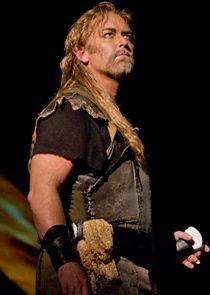The Met unveils its new Siegfried

Jay Hunter Morris took over Siegfried on a week's notice.
Photo © 2011 The Metropolitan Opera
Even the most ardent Wagner addict finds Siegfried a tough pill to swallow. The necessary "middle chapter" of the Ring has a male-dominated cast, and its story of a genetically perfect super-man killing off dwarves and dragons presents problems to both the singers and the director.
In his third installment of the Metropolitan Opera's new production of Der Ring des Nibelungen, Robert Lepage met the opera's challenges with occasional ingenuity. To his credit, Mr. Lepage excels at coming up with new uses for the multi-million-dollar unit set, dubbed "the Machine" by the Met stagehands.
The twenty-four computer-controlled planks were fairly well-behaved at the Thursday night premiere. They bent into the roof of Mime's cave, the forest around Fafner's cave, and Brunnhilde's rock. Mr. Lepage used this opera to indulge his fascination with forests, creating convincing 3-D images of rock pools, caves, and birch trees, with moving bits generated by computerized fractals. The motion-triggered, computer-projected scenery (by Pedro Pires) was fun to look at for a few minutes, but ultimately proved distracting.
The best singing of the night belonged to Gerhard Siegel as Mime, the evil dwarf who raises the title character as a troubled boy and apprentice smith. Mr. Lepage staged the opera's Prelude, showing Mime stealing baby Siegfried from a dying Sieglinde, and including a quick montage of the young warrior growing up. Mr. Siegel sang the part with an unending sense of melody, using great skill to actually sing where other character tenors merely screech. His Riddle Scene with the Wanderer (Bryn Terfel, playing Wotan, disguised by a high-crowned hat) was a highlight of Act I, with both singers making the duel of wits engaging.
Jay Hunter Morris stepped into Siegfried's boots a week ago, replacing an indisposed Gary Lehman. The Texan tenor overcame a spotty Act I and an under-whelming (and very fast) Forging Song to deliver a strong Act II and III. He capitalized on the tender side of Wagner's young hero, especially in the Forest Murmurs. The soft passages with the Forest Bird had a naïve enthusiasm. That same energy drove his fight with the dragon Fafner. This was a clumsy-looking "dragon" puppet, envisioned as a big snake, hung from wires on the "Machine." It is a complement to say that Mr. Morris did not look too silly in this scene.
When Fafner was killed, Mr. Lepage cribbed Patrice Chereau's idea of bringing the ring's guardian onstage in giant form, with Siegfried's sword sticking in his ribs. Bass Hans-Peter König did a credible job as the dragon/giant, sounding better in the latter half of the short role, if only because his voice was no longer amplified. The difficult, following scene with Mime was well handled, with the dwarf's death staged as an act of gratuitous payback. Eric Owens' grim Alberich doesn't have much to do in this act but sound menacing, and he did that very well.
After confronting and dispatching Mr. Terfel's uncertain Norse god, Mr. Morris charged across the Machine, which was bending and contorting itself into Brunnhilde's fiery rock. By this time, the singer was beginning to show signs of strain as he battled the raging fire and thundering orchestra. However, he recovered on the summit, and did well in the final duet, waking Brunnhilde with great tenderness and showing how his encounter with his Valkyrie aunt caused Siegfried to grow up fast.
Last season, soprano Deborah Voigt had a successful spring run in Die Walküre. Tonight was Ms. Voigt's first crack at singing the role in Siegfried., the shortest and highest-pitched of the character's three appearances in the Ring. Although her opening "Heil dir Sonne" was well sung and convincingly acted, she ran into trouble above the stave, producing a brittle tone that turned dry when put under pressure.
That said, the lyric "Ewig war ich, Ewig bin ich" (the same passage that shows up in the Siegfried Idyll) was delivered with tenderness, delving into the Valkyrie's internal feelings regarding her savior, Siegfried. In the last pages, she and Mr. Morris generated some chemistry, but sounded rushed as they raced down Wagner's treacherous scales.
Mr. Terfel was challenged by the lower range of the Wanderer and the need to project grandeur and all-knowing wisdom. That quality was embodied by Patrice Barden. Her Erda was beautifully sung and looked stunning in a black sheath made from cut pieces of mirror and obsidian. Also stunning: Fabio Luisi's approach to the score, with fast tempos that recalled Pierre Boulez' interpretation. The one time he slowed was at the end of the Act III Magic Fire scene, when the Macine made a clunking noise and stopped dead. As Ms. Voigt was placed onstage, Mr. Luisi hit the brakes, and the audience held its breath. When the set started moving again, so did Siegfried.

